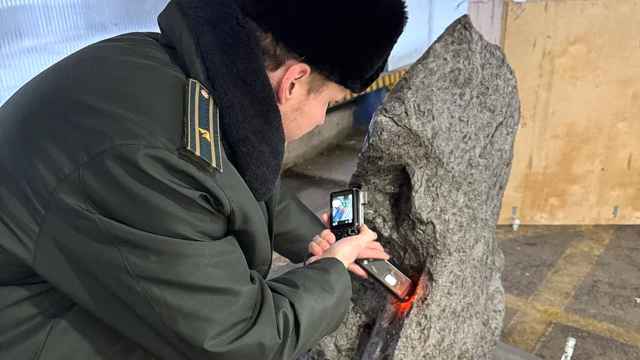 Yulia Latynina
Yulia LatyninaOne month after the Tsarnaev brothers detonated bombs at the Boston Marathon, Moscow authorities arrested a U.S. citizen they suspected of being a spy.
We are told that Ryan Fogle, a U.S. diplomat with the U.S. Embassy in Moscow, attempted to recruit an FSB officer who traveled with U.S. intelligence and law enforcement agents to the North Caucasus to investigate ties the Tsarnaev brothers had to the region and learn about local Islamic extremists in general.
It is obviously humiliating when a spy's cover is blown and national television shows the authorities holding him face down on the ground wearing a silly wig and carrying a compass and a large amount of cash.
Following the Boston attack, it seemed as if the CIA and FSB had embarked on a new phase of close cooperation. So why ruin that? Russia could have arrested Fogle quietly and deported him, like they did with another suspected U.S. spy in January. So why did they show Fogle's arrest on national television with so much pomp and circumstance?
Even if the FSB officer had played along with the game and handed over seemingly classified information on Caucasus extremists, it would not have compromised Russia's national security. On the contrary, the situation presented an ideal opportunity to play a double game by feeding disinformation to the U.S. without placing Russia at risk at any time.
Suppose the FSB agent, with the sanction of his superiors, had first contacted Fogle and offered to hand over information with one goal in mind: to humiliate the U.S. after Fogle was arrested in a wig and publicly mocked on all television stations. In that case the situation is even stranger. That would mean the FSB had deliberately betrayed its presumed partner in the battle against terrorism simply for the perverse pleasure of watching it get its nose rubbed in the dirt.
There is also a third possibility. Let's suppose that the FSB agent was unswayed by Fogle's attempt to recruit him and equally uninterested in playing Fogle in a double game. Why would the FSB want to humiliate its newfound ally? Couldn't they have just called over to the resident CIA chief and told him to rein in his hounds?
This story seems to indicate that the FSB is suffering from an extreme case of paranoia and that it sometimes makes bizarre decisions motivated by considerations other than national security.
I think the most likely explanation is that there was an FSB general who was on the verge of being fired for running a corrupt racket and he decided to stage a showy PR stunt to save his rear end. He wanted to show Putin how his men are keeping Russia safe from U.S. spies, while earning extra brownie points for publicly embarrassing the U.S.
The Kremlin has long believed that Washington is attempting to topple Putin by financing not only the opposition and nongovernmental organizations, but also Islamic extremists in the North Caucasus.
In any case, the CIA at least followed rational motives. They knew that Islamic extremists in the North Caucasus were a danger to the U.S. and wanted to have a firsthand source of information about them.
The motives of the FSB are clearly irrational. Perhaps the agency was hoping for a few PR points, but the job of intelligence agencies has nothing to do with PR.
Yulia Latynina hosts a political talk show on Ekho Moskvy radio.
A Message from The Moscow Times:
Dear readers,
We are facing unprecedented challenges. Russia's Prosecutor General's Office has designated The Moscow Times as an "undesirable" organization, criminalizing our work and putting our staff at risk of prosecution. This follows our earlier unjust labeling as a "foreign agent."
These actions are direct attempts to silence independent journalism in Russia. The authorities claim our work "discredits the decisions of the Russian leadership." We see things differently: we strive to provide accurate, unbiased reporting on Russia.
We, the journalists of The Moscow Times, refuse to be silenced. But to continue our work, we need your help.
Your support, no matter how small, makes a world of difference. If you can, please support us monthly starting from just $2. It's quick to set up, and every contribution makes a significant impact.
By supporting The Moscow Times, you're defending open, independent journalism in the face of repression. Thank you for standing with us.
Remind me later.





